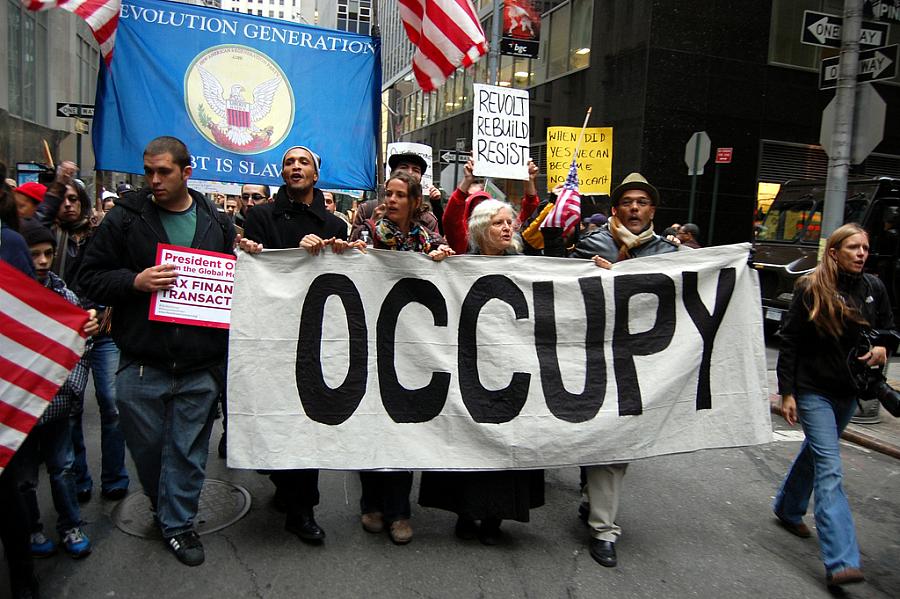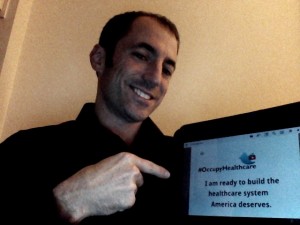Occupy Healthcare: Swapping Tents for Online Advocacy

As Occupy Wall Street protesters continue to clash with police in New York and elsewhere around the nation, a quieter Occupy Healthcare movement is burgeoning online.
A small but growing collection of new websites, blogs, Google groups and Twitter feeds are worth monitoring for health perspectives from the 99 percent and the health workers who treat them. Here's a closer look at some of them.
Contributors to the Occupy Healthcare website hope to use the Occupy meme to reset the national conversation (or screaming match, depending on your perspective) on health care issues – and it's already is getting media attention.
Elsewhere online, a related Occupy Healthcare Google group is generating plenty of discussion and an Ushahidi-powered CrowdMap collects and maps Occupy Healthcare reports from around the country. There's a Healthcare for the 99% blog and a number of Twitter feeds and hashtags worth following, including @DoctorsForThe99 and #OccupyHealthcare, where a scheduled Twitter chat using that hashtag drew nearly 1,200 tweets earlier this month.
 I asked psychologist Benjamin Miller, a University of Colorado-Denver professor who set up the Occupy Healthcare website, to tell us more about the site and its goals. Here are his emailed comments:
I asked psychologist Benjamin Miller, a University of Colorado-Denver professor who set up the Occupy Healthcare website, to tell us more about the site and its goals. Here are his emailed comments:
Who started the Occupy Healthcare site and why?
While I personally started the website, it was never meant to be about me or my interests. The website was envisioned to be a place where the community could come together and have a meaningful dialogue. A place where healthcare could be discussed openly by patients, providers, payers and policy makers. As I wrote on our "about page":
This is not about me. It is not about you. This is about us. How can we, the community, have our moment to influence and impact healthcare? Or, as the Occupy Wall Street movement has shown, how can we, the community, rise up and demand more for "the 99%"?
There is no doubt that healthcare is not meeting the needs of the public. The IOM has reported that the "current healthcare system is incapable of meeting the present let alone future needs of the American public". However, in the face of what is not working, there are stories upon stories of healthcare innovation that is working. But how many people in the community know that healthcare can be better? And of those who know, why are they not demanding more?
This is the basic premise of Occupy Healthcare – that we, the collective community, can demand more from healthcare. That we, the community, can have a healthcare system that strives to place the patient and their family first. That we, the community, can advocate for a system that strives for value not volume. That we, the community, can push for policies that support an integrated, efficient and effective healthcare system. This is why we started occupy healthcare. This is what we all want to work towards – change.
What do you hope the website will accomplish?
We hope the website will shed some light on many of the problems that exist in healthcare, and offer innovative solutions that the community is coming up with to combat some of the problems seen in healthcare. We do not want this to only be a place of complaints, but rather a place where we can join as a community and discuss healthcare. We want the website to be a resource for those interested in demanding more from healthcare. It will take more than a website to change a broken and fragmented delivery system, but yet when there is no one "Wall Street" for healthcare, this website can be a gathering place of sorts. This website can help unite the community and move them to action on healthcare. While we are limited in scope now (website only), we are working on creating opportunities for the Occupy Healthcare community to meet in their respective communities and continue to further the dialogue on healthcare. Much more about this will be rolled out over the coming weeks on the website and through the Facebook page.
What are journalists missing in the debate over health care, and what do you think they should be covering?
This is a tough question because many journalists do get it. Take, for example, Jonathan Cohn. In his book, Sick: The Untold Story of American Healthcare, Jonathan highlights the human face of a broken healthcare system. Jonathan gets it. I would challenge the journalist community to look at some of the brilliant innovations unfolding every day in response to what is not working.
Take for example primary care practices, which are integrating mental health providers to better meet the whole person needs of their patients. Consider the primary care practices that are going back out to the community rather than simply waiting for the community to come to them. And what about all the providers who are working with patients on bettering their health rather than simply telling them what to do differently?
I think journalists would do well to recognize innovation, listen to the voices of the patients and attempt to help put that real human face on the healthcare that is so desperately needed. While we try to figure out all the financial aspects to healthcare, it is always better when we stop and look at who we are serving, why and how well we are doing.
Photo credit: OccupyHealthcare.net
Home page photo credit: bogieharmond via Flickr

